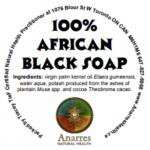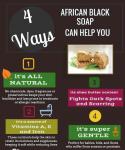Soap: African Black in Jar
Easy to enjoy this #hydrophilic (absorbs #moisture from the air!) #soap and close it back up safe and sound in this handy lightweight screw-top jar!
#AfricanBlackSoap is naturally rich in #vegetable #glycerine, #vitamins A & E, plus #iron. There are no chemicals added as preservatives, colour enhancers, or fragrances.
AFRICAN BLACK SOAP is an excellent gentle skin #conditioner that is traditionally used to treat all manner of #skin problems from #acne to #eczema. It is high in #vitamins A & E and #iron. Unlike other so-called "black soap" on the market, this one is made from a few ingredients - #plantain skins, #cocoa pods, water and #homemade palm oil - and no dyes, scents, preservatives or detergents are added. You can form the soap into balls, press into moulds or containers, or create a liquid soap with water, as you like.
Ingredients: virgin palm kernel oil Elaeis guineensis, water aqua, potash produced from the ashes of plantain Musa spp. and cocoa Theobroma cacao.
How I came into possession of my first large chunk of real black soap:
Thomas Amoah aka The Shea Butter Man contacted me in January 2011 for ideas on how to package the authentic black soap his village of Aburi (25kms outside of Accra, Ghana) makes. Together, we figured out how to pack in jars for use in the shower and for travel. Thomas bought a 1.5-acre compound and hires people who have lived on the streets of Accra to make shea butter and black soap for the international market and with my help, lotions and creams for African markets.
Origins
Black Soap, Ose Dudu or Alata Samina is a true West African Soap. Black soap has its origins among the Yoruba in Nigeria but receives more widespread use and production among Ghanaians.
Legend has it that the black soap was introduced to Ghana many years ago, by Yoruba traders doing business in Ghana. These traders were women and many were in the business of selling tomatoes and peppers. They were called the Alatas (Pepper Sellers). Samina is an Akan word for soap. The word Alata Samina, coined by Ghanaians, means 'The Pepper Traders Soap'.
Description: In Africa, black soap is the only homemade soap used by mothers to wash their newborn babies as its purity makes it gentle and non-drying for their sensitive skin. This African Black Soap is hand-made in small batches using age-old traditional techniques. The authentic African Black Soap is handmade in Ghana from pure virgin oils following fair trade and organic guidelines.
Storage of African Black Soap African Black Soap is a soft-milled soap and has a very high natural glycerine content. As a result, it readily absorbs moisture from the air. It must be stored in a dry location or in a sealed container or it will become soft as it absorbs moisture. Black soap exposed to the air will have a thin white-coloured film. This film is not mold - it is caused by water absorption from the air. This can be avoided by keeping the soap in a dry location away from moisture until ready for use.
How African Black Soap is Made: All ingredients are simple and natural. The soap is made in the traditional way from charred plantain skins and cocoa pods soaked in water to form the lye, which is then added to palm oil. The soap-making process is highly sophisticated and requires hand-stirring for at least a day. The mixture is cooked, and then the semi-liquid soap is scooped out and left to set. After the soap has crystallized, it is allowed to cure for two weeks.
Uses of African Black Soap: African Black Soap is an excellent all-purpose soap. It is recommended especially for individuals with sensitive skin. In Africa, it is known for making smooth skin and is also used to treat skin irritations and other skin conditions.




